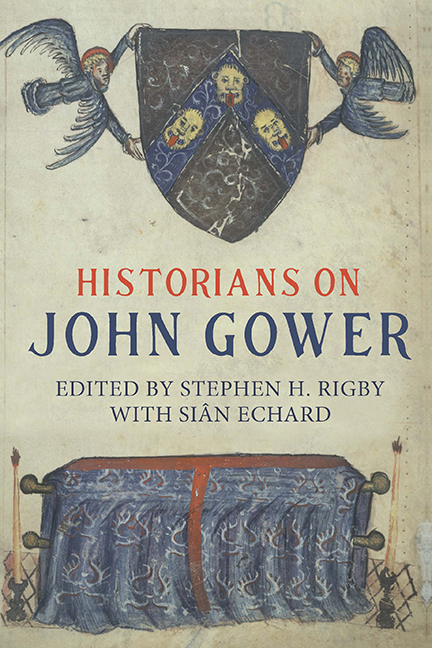Book contents
- Frontmatter
- Dedication
- Contents
- List of Illustrations
- Notes on Editors and Contributors
- Acknowledgements
- List of Abbreviations
- A Note on the References
- Preface: Gower in Context
- PART I Gower’s Life and Works
- PART II GOWER AND LAY SOCIETY
- PART III GOWER AND THE CHURCH
- PART IV GOWER AND GENDER
- PART V GOWER AND POLITICS
- PART VI GOWER AND COSMOGRAPHY
- Select Bibliography
- Index
- VOLUMES ALREADY PUBLISHED
14 - Natural Sciences
Published online by Cambridge University Press: 26 May 2022
- Frontmatter
- Dedication
- Contents
- List of Illustrations
- Notes on Editors and Contributors
- Acknowledgements
- List of Abbreviations
- A Note on the References
- Preface: Gower in Context
- PART I Gower’s Life and Works
- PART II GOWER AND LAY SOCIETY
- PART III GOWER AND THE CHURCH
- PART IV GOWER AND GENDER
- PART V GOWER AND POLITICS
- PART VI GOWER AND COSMOGRAPHY
- Select Bibliography
- Index
- VOLUMES ALREADY PUBLISHED
Summary
The natural sciences play a fundamental role in John Gower's work. Education, whether for personal or political improvement, is an explicit theme of his writing, and he makes clear that ‘the wyse man’ should seek understanding of ‘The world which neweth every dai’ (CA: Pro.59–65). To this end, he furnishes his readers with a multi-layered cosmology. Scholars have confidently traced the encyclopaedic sources on which Gower drew, painting a portrait of a writer whose scientific interests reliably reflected late medieval scientific orthodoxy. However, some of his lesser known sources have remained unidentified or unappreciated. Gower's use of these sources in some pivotal passages of his writing reveals subtle but significant features of his scientific interest that have not previously been recognised, and offers new insights into the debated issue of his scientific expertise. Medieval natural philosophy was an enormously wide-ranging field, so the main focus of this chapter will be ‘the science of Astronomie / … Withoute which, to telle plein, / Alle othre science is in vein’ (CA: VII.625–32). A close examination of Gower's descriptions of stars in Book VII of his Confessio Amantis– whose details, sources and scientific significance have previously been poorly understood – will allow us to draw wider conclusions about Gower's overall scientific knowledge and beliefs. An updated understanding of the significance of sciences, from mathematics to magic, provides a more nuanced picture of the scientific interests that not only inform Genius's education of the king within the Confessio, but also feed into the wider worldview present throughout Gower's work.
First, a caveat: for the purposes of this chapter, ‘scientific’ refers to the description and exploration of nature: ideas and practices that bear a ‘family resemblance’ to modern science. This definition does not encompass the full breadth of science as defined by Gower himself. For Gower in Book VII of Confessio Amantis, the ‘sciences’ are the branches of philosophy in its entirety, divided first into theory, rhetoric and practice (VII.27–41), and, in turn, subdivided into sciences ranging from theology, via arithmetic, to ethics. Some justification may therefore be required for an approach that discusses knowledge about nature separately from other subjects. After all, one of the themes of Book VII is the interrelationship of the different points of philosophy.
- Type
- Chapter
- Information
- Historians on John Gower , pp. 491 - 526Publisher: Boydell & BrewerPrint publication year: 2019



